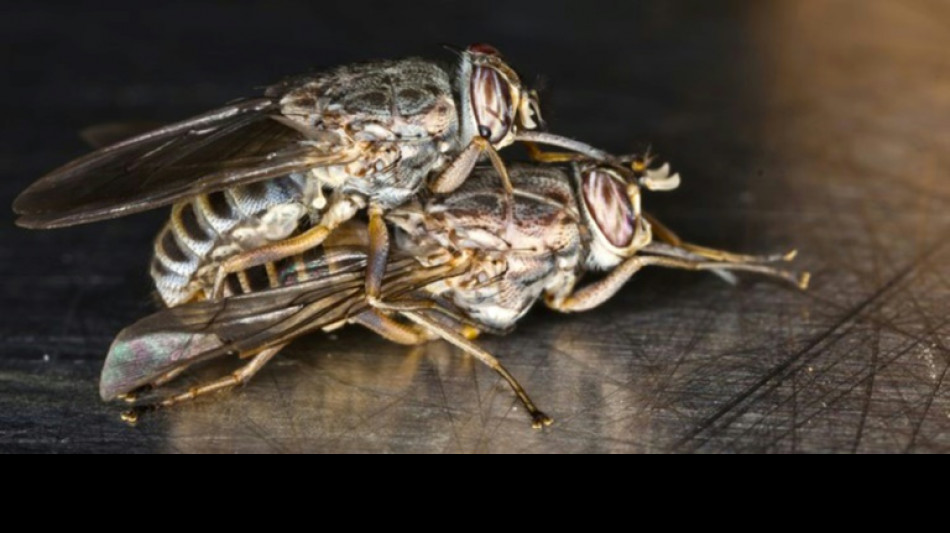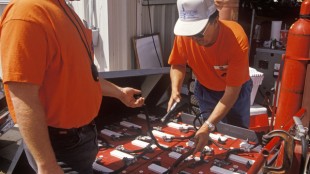
-
 German emissions cuts slow, North Sea has warmest year on record
German emissions cuts slow, North Sea has warmest year on record
-
France's Lucu a doubt for Six Nations opener

-
 Could Trump's desire for Greenland blow up NATO?
Could Trump's desire for Greenland blow up NATO?
-
Reigning champion Al-Rajhi abandons Dakar Rally

-
 UN accuses Israel of West Bank 'apartheid'
UN accuses Israel of West Bank 'apartheid'
-
US, Ukraine teams tackle 'most difficult issues' in Russia war talks: Zelensky

-
 Trump says Venezuela to hand over oil stocks worth billions
Trump says Venezuela to hand over oil stocks worth billions
-
Slot says Liverpool can still do 'special things' ahead of Arsenal clash

-
 Brigitte Bardot to be buried in Saint-Tropez as cause of death revealed
Brigitte Bardot to be buried in Saint-Tropez as cause of death revealed
-
Iran executes man on Israel spying charges: judiciary

-
 O'Neil succeeds Rosenior as Strasbourg coach
O'Neil succeeds Rosenior as Strasbourg coach
-
Slot says Liverpool can still do 'special things'

-
 Europe faces transport chaos as deadly cold snap persists
Europe faces transport chaos as deadly cold snap persists
-
Bangladesh in talks with ICC over fate of cricket World Cup games

-
 Bardot to be buried in Saint-Tropez as cause of death revealed
Bardot to be buried in Saint-Tropez as cause of death revealed
-
England's brilliant Bethell savours 'very special' maiden century

-
 Lenovo unveils AI agent to bridge PCs, phones and wearables at CES
Lenovo unveils AI agent to bridge PCs, phones and wearables at CES
-
Gauff drags US into United Cup semis as Swiatek also wins

-
 Oil extends losses as Trump flags Venezuela shipments, stocks mixed
Oil extends losses as Trump flags Venezuela shipments, stocks mixed
-
Medvedev extends strong start to season ahead of Australian Open

-
 Bethell slams maiden century to leave final Ashes Test on knife edge
Bethell slams maiden century to leave final Ashes Test on knife edge
-
Nollywood meets Bollywood: filmmaker fuses Indian, Nigerian culture

-
 India women's historic cricket World Cup win fires up T20 league
India women's historic cricket World Cup win fires up T20 league
-
South Korea's Lee says urged Xi to help curb North's nukes

-
 England's Bethell hits maiden Test century as family watch on
England's Bethell hits maiden Test century as family watch on
-
US car market expected to moderate in 2026

-
 Swiatek, Gauff ease to United Cup victories
Swiatek, Gauff ease to United Cup victories
-
Strasbourg face pitfalls of multi-club system as Chelsea take Rosenior

-
 Bethell stands tall as England 174-3 in final Test, nine behind
Bethell stands tall as England 174-3 in final Test, nine behind
-
Ex-CIA agent convicted of spying for Soviets dies in prison

-
 James, Doncic carry Lakers past Pelicans
James, Doncic carry Lakers past Pelicans
-
Vietnamese caught in Japan's illegal worker crackdown

-
 Nostalgia and new fans as Tamagotchi turns 30
Nostalgia and new fans as Tamagotchi turns 30
-
Oil extends losses as Trump flags Venezuela shipments, stocks wobble

-
 Overseas scholars drawn to China's scientific clout, funding
Overseas scholars drawn to China's scientific clout, funding
-
From music to mind reading: AI startups bet on earbuds

-
 'Of course it's not safe': small city in Russia tries to shrug off war
'Of course it's not safe': small city in Russia tries to shrug off war
-
'Simple' goodbye to Bardot lined up in Saint-Tropez

-
 England lose Crawley as they battle to save final Ashes Test
England lose Crawley as they battle to save final Ashes Test
-
Nvidia CEO praises robots as 'AI immigrants'

-
 Talks on Ukraine guarantees to continue after Paris 'progress'
Talks on Ukraine guarantees to continue after Paris 'progress'
-
Forte Group Confirms Effective Date of Corporate Name Change to VANTA, advancing its Blackwater Ready-to-Drink Platform and Longevity-Focused Nutraceutical Strategy, and Announces Strategic Share Consolidation to Advance Corporate Growth and Capital Markets Presence

-
 Cytora Therapeutics, Made Scientific, and Zeo ScientifiX Announce Partnership to Manufacture and Commercialize Cytora's Allogeneic Stem Cell Therapy in the United States
Cytora Therapeutics, Made Scientific, and Zeo ScientifiX Announce Partnership to Manufacture and Commercialize Cytora's Allogeneic Stem Cell Therapy in the United States
-
Greene Concepts Answers Consumer Demand with Renewed Focus on Gallon Be Water Sales

-
 Adnex Group Berhad Signs Underwriting Agreement with Public Investment Bank Berhad Ahead of ACE Market IPO
Adnex Group Berhad Signs Underwriting Agreement with Public Investment Bank Berhad Ahead of ACE Market IPO
-
ELEKTROS INC Accelerates Forward - Expanding Advisory Board to Power the Next Phase of Growth

-
 Chromalloy Appoints Kristen Samson as Vice President of Marketing & Communications
Chromalloy Appoints Kristen Samson as Vice President of Marketing & Communications
-
Wellgistics Health Provides 2026 Corporate Outlook

-
 Protagonist Therapeutics to Participate in the 44th Annual J.P. Morgan Healthcare Conference 2026
Protagonist Therapeutics to Participate in the 44th Annual J.P. Morgan Healthcare Conference 2026
-
Nepra Foods Appoints Cotter Stern as Director of Ingredient Sales


Discovery of tsetse fly mating behavior may help curb sleeping sickness
Researchers have identified chemicals in tsetse flies that control their mating behavior, a discovery that may well aid the fight against the disease-causing insects in sub-Saharan Africa.
"It could be used in traps to make them more effective in trapping tsetse flies," said John Carlson, a biology professor at Yale University and one of the authors of a study published Thursday in the journal Science.
Trypanosomiasis, also known as sleeping sickness, is caused by parasites transmitted by the tsetse fly. It affects humans and domestic animals.
The disease threatens millions of people in dozens of countries in sub-Saharan Africa.
Animal trypanosomiasis, known as Nagana, kills some three million cattle each year, an annual cost of $1.2 billion, according to a companion article in Science.
It is considered a major cause of rural poverty and the authors warned that the geographic range of the tsetse fly is expected to grow as a result of climate change.
For the study, the researchers focused on pheromones, chemical compounds an animal releases that affect the behavior of others of the same species.
Pheromones allow insects to identify each other in an environment where there are potentially thousands of other species.
The Yale researchers identified volatile sex pheromones that had not previously been isolated in tsetse flies despite more than a century of study.
Pheromones are currently used to control a wide variety of other insect pests such as moths.
Pantry moths, for example, can be caught using sticky traps baited with a plastic disc soaked with an attractive pheromone.
- 'The flies stop moving' -
For the study, the researchers soaked tsetse flies in liquid and then used a gas chromatograph-mass spectrometer to identify specific chemicals.
One of them, methyl palmitoleate (MPO), acted as an aphrodisiac, attracting male tsetse flies.
In tests, male tsetse flies were attracted to decoys -- knots in yarn doused with MPO -- and, unusually, to females of another tsetse fly species.
Olfactory neurons on the antennae of the flies were found to increase their firing rates in response to MPO.
"Not only is MPO an attractant, but it causes tsetse flies to freeze -- the flies stop moving," Carlson said.
Current traps for tsetse flies use animal odors but MPO tends to last longer and could "enhance the effectiveness of traps," he said.
Carlson said field tests using MPO were getting underway in Kenya.
The type of pheromone identified in the study may not be effective against all types of tsetse flies, however.
The study focused on the species Glossina morsitans, a major vector of the disease in cattle, not on Glossina fuscipes, which causes the most human cases of the disease.
But Carlson said he was optimistic that the research methods used could lead to identifying pheromones from other tsetse species.
L.Miller--AMWN



